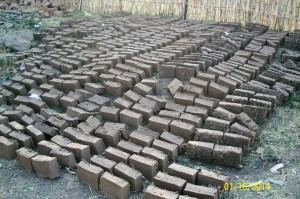
Tough or Hard
In front of me are three objects: a brick, a piece of leather, and a hammer. These make for a wonderful lesson.
However, this story is not about the hardness of a brick, toughness of leather, or the pain of the hammer blow. This is a story about somebody. Objects don’t move us—but people do.
Watching folks go through difficult times is revealing. Periods of trial and adversity serve to distill what is really inside people. What’s revealed often surprises and shocks us.
Hurricanes Katrina and Rita did that for us in Louisiana. The whole world saw the worst side of humans—you saw it on the television with the looting, abandonment and loss in New Orleans.
Then again, this storm blew in and exposed the best sides of humankind. Strangers reaching across all sorts of lines—racial, cultural, or geographical—to help others in need.
Observing it, I was amazed watching how our storms, and the ensuing difficulties that followed, elicited completely different responses in people. Some folks, comfortable living their lives as victims, continued blaming the world for their troubles. Others in exactly the same circumstances quickly got back up, dusted themselves off and went to work, choosing to be a victor instead of a victim.
The human spirit and corresponding attitudes are amazing to observe. It comes down to this: Life will make you either hard or tough.
You become either bitter . . . or better.
# # #

Let’s look at our three objects: the brick, the hammer, and the strip of leather. Place the piece of leather and the brick on a sidewalk side by side. Now, take the hammer and hit each one of them hard several times. The brick will be broken into pieces. The piece of leather may show the hammer’s indents, but it will not break or crack.
Because bricks are hard, but leather is tough.
What happens to us—it’s called circumstances—will make us either hard or tough. These situations are the hammer blows. It doesn’t matter whether the bows are self-included or due to chance or fate. They may be due to family circumstances, what we call rotten luck, a cancer diagnosis, or a hurricane
The sources of life’s hammer blows are limitless.
These blows come to all of us. No one is immune.
Some people will become tougher when the hammer falls. They take the blows, their lives showing the imprints of the hammer, but they are supple and flexible. They come out of this experience tougher and still whole.
Under the same circumstances others, like the brick, crack and crumble under the same blows. That is because like the brick, they have become hard.
Sadly, hardness does not ensure toughness. There are hard-to-miss traits that exemplify hardness in life: bitterness, an attitude of apathy toward the needs and pain of others, or a selfish callousness that strives to isolate oneself from the world. Add to this list, the telltale symptom of cynicism toward others, God, and spiritual things.
Under the hammer blows of life—who we are, as well as what we really believe—will always be revealed.
Here’s a good question: How do you recognize a tough heart? The short letter below explains the tough heart. It’s from my aptly named friend: Joy Tanner:
2005 was a tumultuous year of storms for Jack and me; the fiery fatal plane crash in which our daughter lost her life; the people with whom we spent twenty years in Cameron Parish who lost it all because of Hurricane Rita; the news that our deceased daughter’s only child is going to Iraq; my husband Jack’s Lou Gehrig’s disease.
In spite of the great losses, we’ve become better instead of bitter. It’s a peace that comes from the inside, from inside the heart where the mold cannot grow.
And the water cannot flood.
And the hurricane-force winds cannot reach.
And the flames of the plane crash cannot burn up.
Amen and amen,
Joy Tanner
Her letter reveals the heart of a brave and tough woman who has not allowed her spirit to be hard.
Her name—Joy—says it all.
Joy—unlike happiness—comes from inside and cannot be taken away by situations, storms, even tragedies.
Joy Tanner was hammered repeatedly in 2005, but she came out of it better, not bitter.
Tough, not hard.
Tough as leather, more useful and usable for God—as well as to others.
Tough, but not hard.
May the same be said of each of us.

 Creekbank Stories Curt Iles, Storyteller
Creekbank Stories Curt Iles, Storyteller
